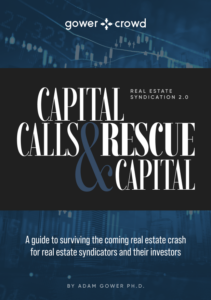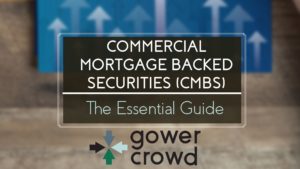The Ultimate Guide to Real Estate Wholesaling
One of the smartest ways to break into real estate investing is real estate wholesaling. Real estate wholesaling allows you to minimize risk and doesn’t tie up capital. But finding success in real estate wholesaling requires work, a solid understanding of the process, and learning the details of a successful deal.
This guide will give you a baseline knowledge of real estate wholesaling, so you can assess if becoming a real estate wholesaler is the right investment opportunity for you.
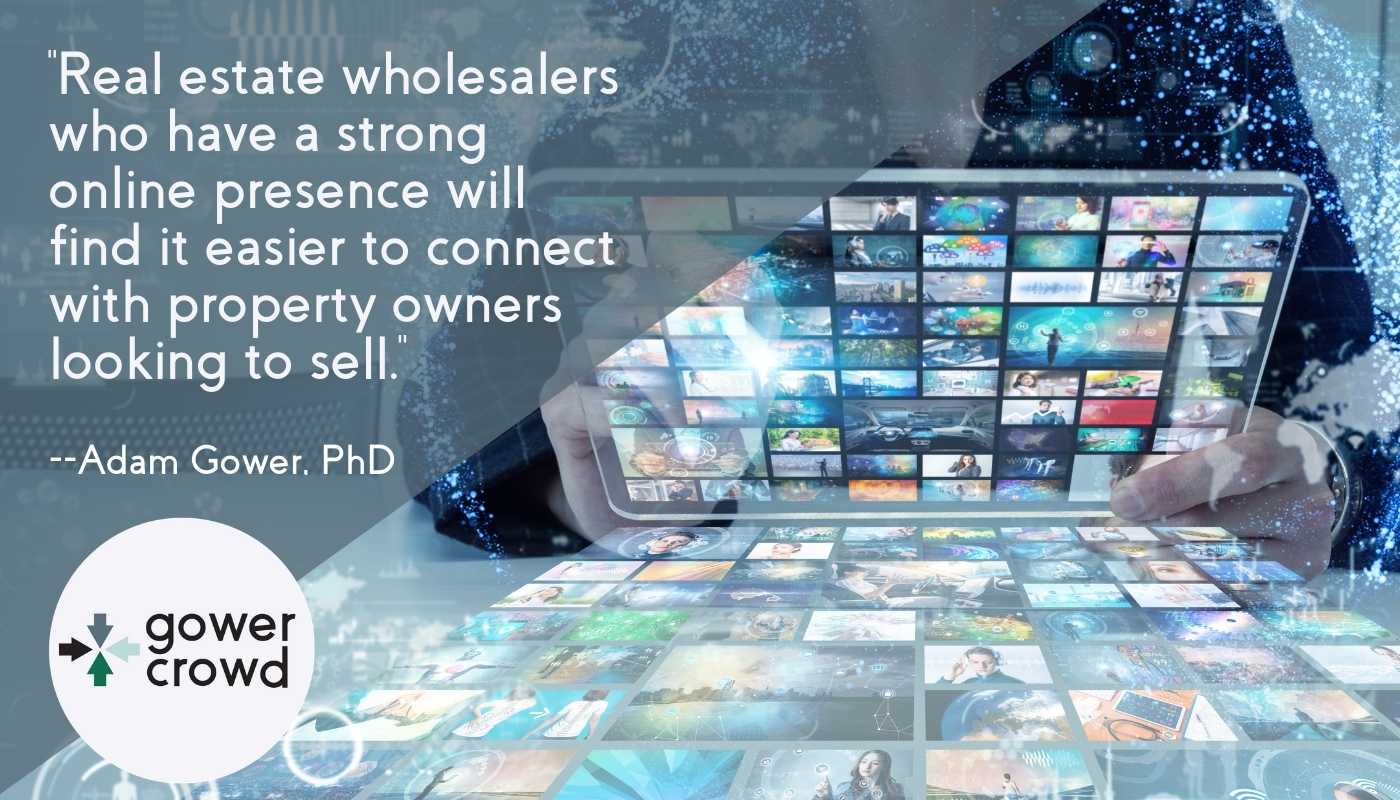
What is Real Estate Wholesaling?
Real estate wholesaling is a real estate development and investment business strategy that requires minimal capital. As a wholesaler, you work to:
- Find a property that is undervalued, distressed, or in need of significant renovations before it is listed on a public real estate market.
- Negotiate a right to buy contract from the seller, typically using an all-cash offer and a promise to close quickly.
- Tack on a finder’s fee of 5%-10% of the property’s value.
- Find another buyer to put under contract and purchase the property. These buyers are often other real estate investors looking for excellent properties to renovate and resell, also known as flipping.
You sell the property to the investor at a wholesale price, which is less than the market value. These properties are generally not publicly listed, so you allow real estate investors to acquire these properties without competing with other buyers.
The ideal property is one in which you can negotiate a purchase price well below market value. The price has to be low enough to add your finder’s fee and any necessary renovations costs and still be attractive enough of a price for an investor to buy and flip the property at market value and turn a decent profit.
Get access to our FREE weekly newsletter exclusively covering the latest updates from the real estate crowdfunding world
How to Wholesale Real Estate
To get started with real estate wholesaling, you’ll need to do your homework to find the right properties. While it doesn’t require significant upfront capital, it may require a small investment to attract the right type of sellers, and it will take time to build a successful network. Wholesale real estate requires research, marketing, and networking to find sellers. To become a real estate wholesaler, you need to follow these essential steps:
Find Off-Market Properties
To get started, you’ll need to find off-market properties. These properties are not listed on public MLS listings. Off-market properties ripe for wholesaling usually include:
- Distressed homes
- Abandoned properties
- Properties in need of significant repairs
- Pre-foreclosures
- Properties of the recently deceased
Finding off-market properties generally takes networking and research to find the best deals. Often, you’ll cold contact property owners about selling their off-market property. You can also try different marketing strategies to attract owners of off-market properties in your target areas.
Many wholesalers will use a strategy referred to as “driving for dollars”. This is when you drive to certain zip codes or certain neighborhoods (usually distressed markets) and take note of abandoned, vacant or other properties that may be conducive for wholesaling. You’ll jot down those addresses, talk to neighbors to obtain history on the property, and then search various online databases (such as tax records) to find out who owns the property and their contact information.
While driving for dollars, wholesalers will usually put up their “bandit signs,” which are essentially mini-billboards posted on lamp posts, utility poles and other prominent areas indicating that you’re looking to buy property in that neighborhood.
Your bandit sign might say something like, “We Buy Any Home for Cash” or “We Guarantee to Close On Your Home in 1 Week or Less!” and will then include your contact information. Bandit signs are a way for wholesalers to get their name out and build up their inventory of homes for sale.
Increasingly, real estate wholesalers are turning to digital marketing to find potential sellers. This works well because owners of distressed real estate may not be located in the same area as a property, and therefore may never see a bandit sign. For example, Great Aunt Sally may have left her home to her nephew who lives on the opposite side of the country.
The nephew may not be at all familiar with the local real estate market, and instead, will likely begin his search online when trying to decide what to do with the property. Wholesalers who have a strong online presence (combined with strategic marketing efforts like Google Ads) will find it easier to connect with property owners looking to sell.
Negotiate a Purchase Price
Once you’ve found a viable property to wholesale, you’ll need to negotiate a purchase price from the seller. This is where having good negotiation skills is critical. You’ll need to research and create a credible argument for offering a low sale price that the seller will agree upon to sell.
The sale price has to be low enough to add your finder’s fee and any necessary renovations costs and still seem like a great deal. It must be attractive enough of a price for an investor to buy and flip the property at market value and turn a decent profit.
Here’s a simple example. If you were to put a distressed home under agreement for $50,000, you’d want to turn around and sell it to another buyer for at least $55,000 or $60,000 to make the deal worth your while (resulting in a $5,000 to $10,00 profit to you). Before putting the property under agreement, you would want to know whether the market could support a subsequent sale of $60,000 given its condition.
Perhaps the property could sell for even more; any additional profit would go directly into your pocket.
You wouldn’t want to mark up the price too high though because there still needs to be enough of a margin for your buyer to earn a profit too. Knowing how to run the numbers on a deal is critical for any real estate wholesaler.

Sign a Contract
Once you and the seller agree upon a sale price, you should put the property under contract immediately. Time is particularly of the essence here. You want to lock in the exclusive right to purchase (and/or sell) this property before the seller thinks to contact another wholesaler or real estate agent. For example, if you seem overly eager to buy a property for $50,000, that seller may soon question whether they can get more for the home by listing it with an agent on MLS. Most wholesalers who receive a verbal offer to sell will try to follow-up with a formal, written contract within the day.
There are two methods of wholesaling, each of which uses a slightly different form of contract:
1. Contract assignment; and
2. Double closing.
Contract assignment is the most common method of wholesaling. It involves putting the property under agreement and, while still under agreement, lining up another buyer to assume the terms of the agreement. In other words, you are selling the contract to another buyer and never taking ownership of the property. Any wholesaler will want to be sure the purchase and sale agreement includes a clause allowing them to assign the contract to a third party in this manner. Some assignment clauses stipulate a time frame in which to procure an alternative buyer.
Wholesaling contracts do not have to be long or overly complicated. Unlike a traditional purchase and sale agreement, wholesale contracts may be a simple, two-page document.
A double closing requires you to purchase and possess the property. This is when you buy the property from the seller and then, almost immediately, sell it to another buyer but utilize a separate purchase and sale agreement and entirely separate closing process. It is common for both of these closings to happen on the same day. Double closings are typically used when the wholesaler is able to sell the property at a significantly higher price than they purchased it for (often using a “daisy chain” as explained below), which prevents any possible insult to the original seller who may otherwise feel that they left significant money on the table.
On occasion, a seller may try to get out of a signed contract, particularly if they feel that they can get more money by selling to someone else (whether that be another wholesaler or on the open market). You still have recourse in situations like these. You can use what’s known as a “lis pendens,” which is a legal process that puts a lien on the property (a cloud on the title) that prevents them from selling until they resolve the contract dispute with you.
Marketing the Property
Once a contract with the seller is finalized, you’ll need to find a buyer. There are several things you can do to attract potential buyers:
- Networking with investors
- Creating a buyer’s list of potential investors
- Advertising and marketing to real estate investors
- Circulating the listing to other wholesalers or real estate agents who may have buyers at the ready
You may need to use all of these strategies depending on the property’s potential for profit. To determine a property’s potential for profit, pull a few local comps to share with prospective buyers – including other distressed home sales as well as homes that have been flipped (“retail properties”), and the profits generated by the investors in the process.
In an ideal situation, you’ll want to arrange a deal directly with the seller. However, working with a buyer’s agent is sometimes necessary depending on market conditions and the strength of your existing buyer’s list. Wholesalers will generally give preference to buyers who they have successfully worked with in the past and who they know have cash on hand and can move quickly to closing.

Determine a Sale Price
Once you find a buyer, you’ll need to agree on the sale price. A common reason why wholesalers fail to procure buyers is because they get overly greedy with their desired sale price and ultimately, struggle to find buyers who will agree to their terms. The sale price should still be well below market value if the property requires significant renovations and you’re selling to real estate investors. But in many cases, you may be selling to a final buyer at just below fair market value.
Transfer the Contract
During this step of the real estate wholesaling process, you’ll need to transfer the contract to the new property buyer, or alternatively, you’ll need to schedule the double closing. Wholesalers look to profit five to ten thousand dollars per deal for aligning the buyer and seller. This is a profitable way to make money through real estate with little to no investment.
You should beware of what real estate wholesalers call the “daisy chain.” A daisy chain is created when one wholesaler assigns a contract to another wholesaler, who then tacks on their own finder’s fee and sells to another wholesaler, who tacks on their own finder’s fee, and so on until finally selling to an investor.
Daisy chains can quickly cause the sales price to escalate (imagine if each wholesaler is adding $5,000 to $10,000 to the top), which can crush any goodwill with the seller. What’s more, most all-cash buyers are on multiple wholesalers’ lists. Depending on his timing, the investor may see the lowest price first or one much higher. The buyer will go to the lowest price wholesaler to get the deal, but that wholesaler might not actually control the deal yet.
This can cause a long relay of information from one wholesaler to another, and eventually buyers become frustrated and walk away from the deal. People can sense when something is up, and all it takes is one inkling of mistrust to kill a deal.
Common Mistakes Made by Real Estate Wholesalers
There are some common pitfalls that you’ll want to avoid as you set out to become a successful real estate wholesaler. Here are some of the most common mistakes made by real estate wholesalers:
Overpaying for a Property
An eager wholesaler will often overpay for a property for the sake of getting it under agreement, only to find themselves unable to add on a finders’ fee and sell the property for a profit. In the most egregious cases, wholesalers actually lose money on a deal – either their earnest money deposit when they fail to procure a buyer within a certain time frame, or by selling the property at a loss.
Wasting Time
This is a tricky one. On one hand, if you’re just getting started with wholesaling, you’ll want to take time to learn the local market and how to evaluate potential investments. You’ll want to visit many homes before putting one under contract. That said, as you gain experience, you’ll want to have systems in place that allow you to move quickly.
You don’t want to waste time with owners who are unlikely to actually sell, or touring properties that do not meet your wholesaling criteria. You should develop a model that allows you to run numbers quickly to determine whether a property will be profitable for you to wholesale.
Not Understanding Your Buyers
Successful wholesaling requires you to develop mutually beneficial relationships—this means that not only should you be consistently building your network of possible buyers, but you should also be taking the time to understand your buyers as well. This means you should make an effort to understand their current financial constraints, their property and neighborhood preferences, and other details that may affect the buying process.
Taking the time to better understand your buyers will also help accelerate the entire wholesaling process. Rather than blindly approaching your network with each new property that hits the market, you can customize your communications and ensure that your buyers are only seeing properties they are interested in actually purchasing.
If you are a wholesaler, be sure to keep a rolling list that includes each of your current and prospective buyers, regardless of where in the buying process they might be. Creating this list will make it much easier to stay organized and communicate effectively as soon as a property of interest emerges.
Not Constantly Searching for New Leads
No matter what you are selling—whether it’s real estate or anything else—the only way to continue generating revenue is to continue expanding your pool of possible buyers. One of the most common mistakes within the wholesaling community is assuming that because you have had a little bit of success with your initial capital network, you will be able to perpetually sustain your operation.
The mantra “Always Be Closing” applies universally to wholesalers, particularly those who are hoping to close relatively larger deals. Networking and lead hunting is an active, rather than a process—the onus remains on the salesperson to continue creating new connections, thinking of new ways to meet prospective buyers, and building positive relationships with these prospects over time.
Luckily, thanks to new digital platforms, there are quite a few ways that wholesalers can continue expanding and enriching their network. Automated sales funnels, email marketing, social media, content marketing, and other digital marketing strategies help make it possible to reach a large, captive audience with relative ease.
Not Expanding Your List of Contractors
If you are wholesaling real estate properties, it is absolutely crucial that you actively maintain a list of reliable contractors. There are many different contractors you might need in the wholesaling process—especially if you are implementing a fix and flip sale—including builders, electricians, plumbers, landscapers, inspectors, and everyone else in between.
When a wholesaler is reliant on a single contractor—regardless of what that particular contractor might do—they are inevitably setting themselves up for future delays. Even if your relationship with a particular contractor has been very productive over the years, having a “deep bench” will help protect you from the future unknown.
Additionally, having a more extensive list of contractors could also potentially help you generate new leads over time. Contractors are frequently working with other people involved in the property buying and selling processes, meaning they may be able to connect with parties that are looking for a wholesaler.
Not Having Clear Communications With Your Buyers
There is no shortage of wholesalers in the United States, meaning your prospective buyers will always have options. One of the most common reasons relationships with buyers deteriorate is due to a lack of clear and effective communications. If you want to develop successful relationships, be sure that you make yourself easy to reach, actively answer prospective buyers’ questions, and communicate clearly and honestly, rather than purely selling.
Advertising a Property You Don’t Own
This isn’t only a bad idea—it’s illegal. Newbie wholesalers often fall into this trap. They’ll see a deal offered by one wholesaler and will begin to advertise that deal to their own buyers, potentially at a marked up price, without actually having the property under control.
You cannot advertise a property for sale that you do not have the rights to.
How does the daisy chain work then, you might be wondering? Although wholesalers cannot advertise properties they don’t own, they can advertise their interest in a contract and disclose that they’re selling this contract to purchase the property that they do not yet own.
Not Ensuring Clear Title
Wholesalers looking to move quickly will often skip valuable steps in the due diligence process, such as hiring a title company to do the research necessary to ensure title to the property is clear. For example, the nephew of Great Aunt Sally might agree to sell the home she left him, but he may have forgot to add that his two cousins also own an interest in the property and will need to agree to sell as well.
The title company will not only confirm ownership, but will determine if there are any liens on the property that may cloud the title (which can be costly to cure).
Paying a Seller Directly
As mentioned above, you’ll often need to put down some form of earnest money when signing a contract. This deposit usually ranges from $1,000 to $5,000 and will be put toward the final purchase price assuming the deal goes smoothly. However, it is a big mistake to give this deposit directly to the seller while still under agreement.
If, for whatever reason, you need to walk away from the deal, you’ll probably never get this money back. Instead, if you give the earnest money to your attorney or title company, they can hold the money in an escrow account and can refund the money to you if you’re eligible per the terms of your agreement.
Giving Up Too Soon
Although wholesaling is a great way for those interested in real estate investing to get their foot in the door, it is by no means easy. Many people will try to wholesale part-time, as a side hustle, if you will. This can lead to a haphazard effort when a full-court press is needed to find inventory to put under contract. This is especially true in a sellers’ market where deals are hard to come by. Wholesalers will often get discouraged and give up too soon. It’s important to stay the course if you want to become a successful wholesaler.
Why Real Estate Investors Like Real Estate Wholesalers
At first it may seem counterintuitive: why would a real estate investor or flipper want to buy a property that has just been marked up by a wholesaler? Why wouldn’t the real estate investor just buy the property directly from the seller, skipping the middleman?
There are a few reasons for this. For one, real estate investors and flippers often don’t have the time to source new properties for sale. A house flipper is usually so entrenched in the renovation of one home that they often can’t spend the time canvassing the market for other off-market opportunities.
As such, they’re all too happy to buy from a real estate wholesaler at a slight markup, assuming the numbers still work well enough for the flipper to turn a profit.
Second, time is everything when it comes to real estate transactions. Some of the best deals require moving quickly, and investors – particularly those who live elsewhere – don’t always have the time to tour properties or conduct due diligence within the time frame needed to buy directly from the seller. The wholesaler fills that gap and can take pictures, host video tours, arrange inspections and manage other aspects of the deal on behalf of prospective buyers.
Lastly, the most successful wholesalers will only tack on a marginal but sufficient finder’s fee, thereby ensuring the end-buyer (the investor or flipper) is still getting the property at a slight discount to market rate. This is how investors find lucrative off-market deals without having to pound the pavement on their own.
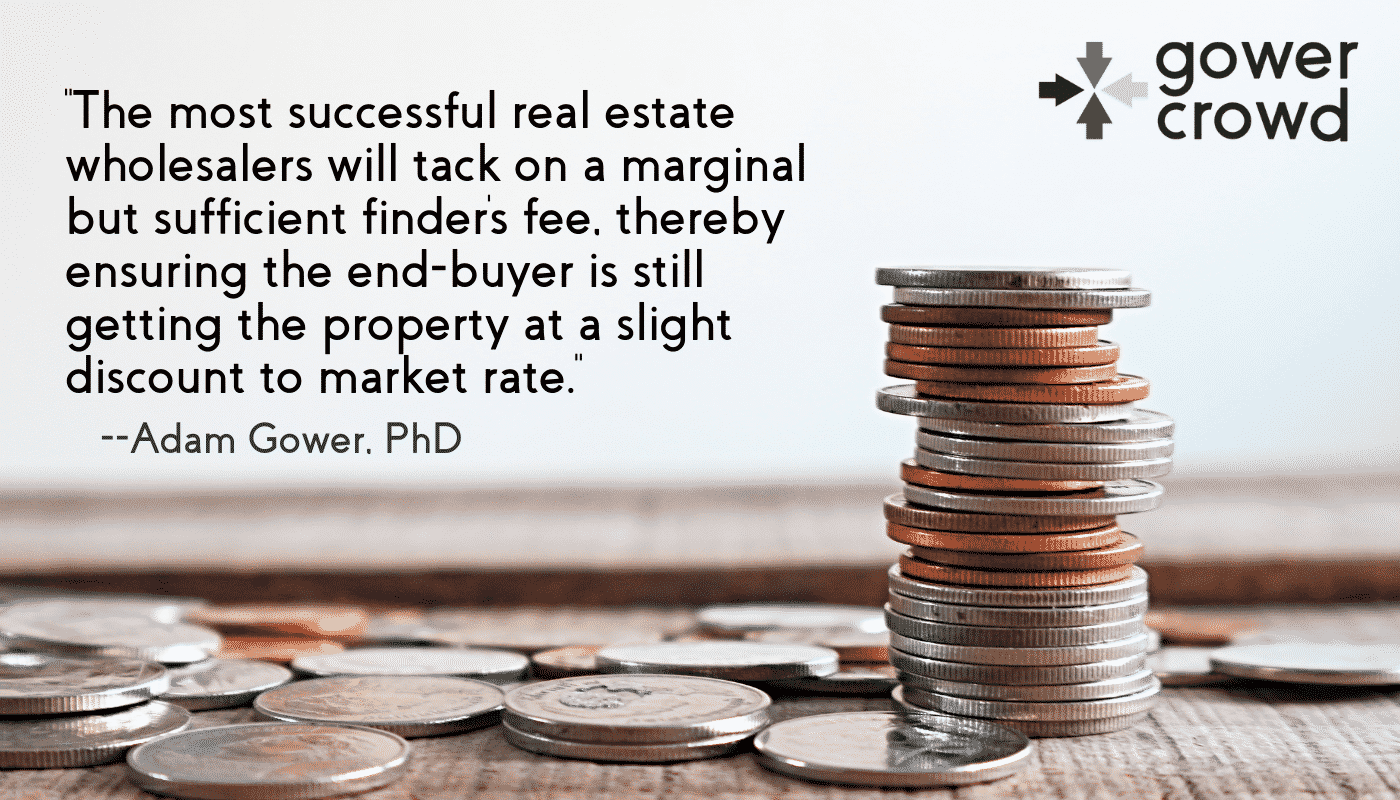
What Are The Advantages of Real Estate Wholesaling?
While real estate wholesaling can require a lot of time, research, and networking, finding the right deals can be advantageous. There are three main advantages of becoming a real estate wholesaler:
Make Money Fast
You can earn about five to ten thousand dollars within a short amount of time. Most wholesalers can close deals within ten to fourteen days versus a traditional real estate closing that may take between 30 and 60 days. Wholesalers are able to move faster given that most of these deals are arranged using all-cash offers and do not require bank financing.
Educate Yourself about Real Estate Market
Wholesaling is a great way to immerse yourself in the real estate market. You’ll learn the real estate process’s ins and outs that can carry over into other types of real estate investments.
Little Cash Involved
Real estate wholesaling requires minimum up-front capital and doesn’t require a great credit score. Because you are acting as a middleman between the seller and buyer, you risk little of your own cash in the process.
There are a few caveats to this, however. The first is that most real estate offers require the buyer to put down some sort of earnest money deposit, which is held in escrow, that can be kept by the seller if you do not fulfill your contract obligations. This is usually a nominal amount, ranging from $1,000 to $5,000. That money will then go toward the purchase price.
When contracts are assumed by other buyers, you (the wholesaler) will be repaid this earnest money by the new buyer. A second exception is when engaging in double closings. Since most wholesale deals are completed as all-cash transactions, you’ll need to have the capital to close an all-cash deal quickly before selling it to another buyer. While you’ll be repaid almost immediately (and then some), the double closing method requires you to have more cash on hand than those who utilize contract assignments.
Finally, the most successful wholesalers generally make an upfront investment in signs and other marketing materials needed to grow their databases of potential buyers and sellers.
No Formal Training Required
Unlike real estate brokerage, which requires you to take a real estate salespersons course and licensing exam, there is no formal training or education required to become a real estate wholesaler. While it is generally good practice to understand real estate basics, you do not have to attend a course, pass a test or pay for the upkeep of your license and related insurance.
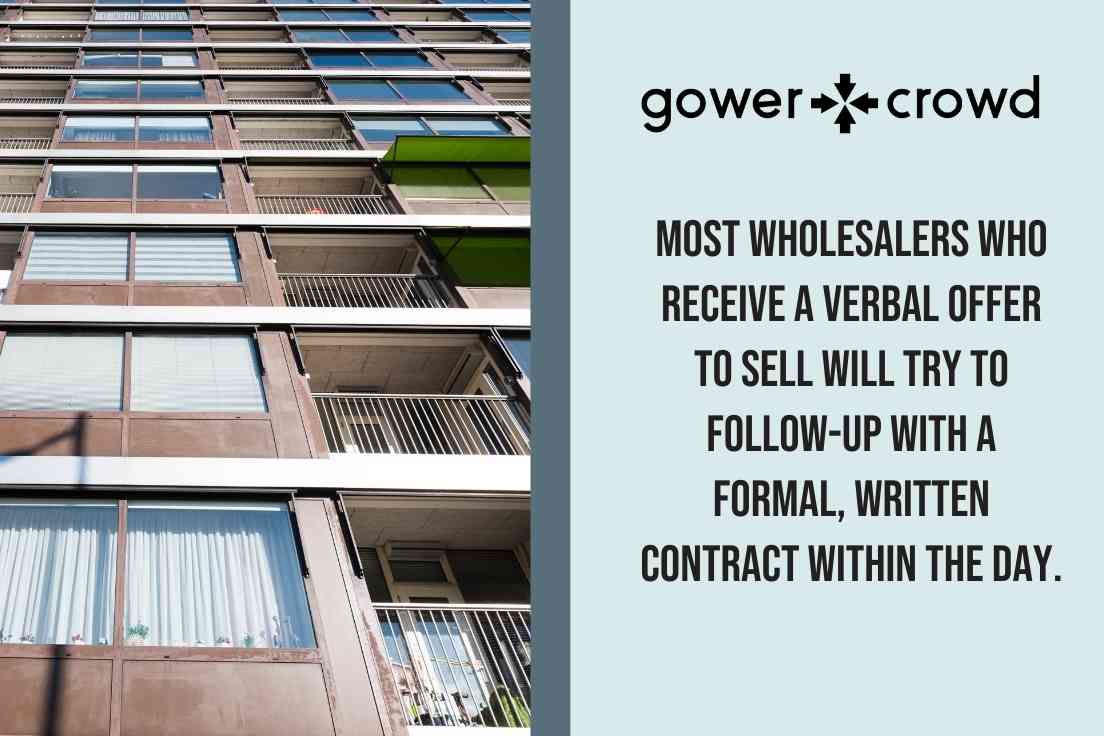
Real Estate Wholesaling is an Excellent Way to Start Investing
If real estate investing is something you are interested in, then you may want to start by becoming a real estate wholesaler. You’ll gain valuable insight into the real estate market without risking large capital amounts.
But it won’t come easy. It will take work to be successful and is mainly dependent on your ability to find both sellers and buyers. Cultivating a list of buyers before you negotiate your first deal is a great way to alleviate some of the unpredictability of real estate wholesaling.
Gower Crowd is committed to helping motivated individuals raise capital, find investors, and grow their wealth. We offer a variety of investment training courses to maximize your returns.
If you liked this article and would like to learn more about raising capital for real estate investing, check out some of the resources below:
If you have only just started in real estate development, have completed no deals, have no email list, but know you want the freedom and wealth being a real estate developer brings, then I suggest your first step is to start evaluating deals so you can recognize a good one when you see it.
Here’s where you should start. You’ll learn everything you need to know – the different types of real estate, different development strategies, how real estate cycles influence the market, and all about due diligence.
If you want to find deals and raise money for them so you can start your real estate development business, then learning how to conduct due diligence so you can pitch your deals better to investors is a great place to start.
If you’ve already purchased one or more real estate project and are seeing more opportunities than you can finance, then now is the time to start building your investor network so you can finance all your next deals quicker.
You’ve already got some momentum; now start finding and educating prospects about what you’re doing so you can build an email list of people to pitch to when you’re ready to raise money for your next deal.
This is what we build for private clients all the time – it’s called the Investor Acquisition System and you can access the entire program right here so you can find prospects, and convert them into being deep pocketed, repeat investors in your deals.
If you are a seasoned pro with multi-cycle experience, a substantial portfolio, a decent deal pipeline, and find yourself spending too much time raising equity capital because you’re still doing it in-person, then it’s time you put technology to work for you.
The wonderful thing about doing this is that you’re not going to be doing anything different than you’re already doing and, guess what, you’ll never have to sit through investor meetings again.
Sounds crazy I know, but I lay the whole thing out for you in this white board workshop where I personally show you exactly what it takes for you to transform your equity raising into a fully automated, capital raising machine so you can find new investors while increasing commitments from your existing network.
RELATED ARTICLES
